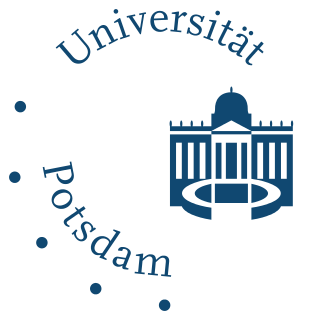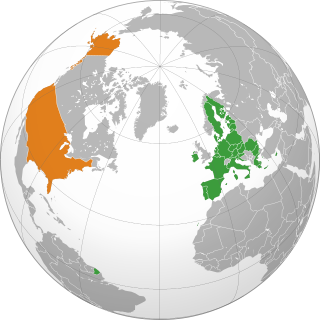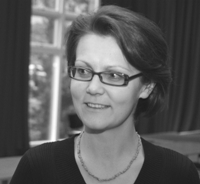
Central European University is a private research university with campuses in Vienna, Budapest, and New York. The university offers intensive graduate and undergraduate programs in the social sciences and humanities, and is known for its low student-faculty ratio, and a highly diverse international student body. Admissions are classified as highly selective with an acceptance rate of 13%. All CEU programs and courses are accredited in Austria, Hungary and the United States.

The University of Potsdam is a public university in Potsdam, capital of the state of Brandenburg, northeastern Germany.

Relations between the European Union and the United States began in 1953, when US diplomats visited the European Coal and Steel Community in addition to the national governments of its six founding countries. The two parties share a good relationship which is strengthened by NATO, cooperation on trade, and shared values.

Giles Scott-Smith is a Dutch-British academic. He is a professor of transnational relations and new diplomatic history at Leiden University and serves as the dean of Leiden University College The Hague.

A public policy school or school of public affairs is typically a university program, institution, or professional school of public policy, public administration, political science, international relations, security studies, management, urban planning, urban studies, intelligence studies, global studies, emergency management, public affairs, nonprofit management, criminology, and the sociology of law.

The College of Education is the undergraduate and graduate education school of the University of Illinois Urbana-Champaign. It was founded in 1905 and took on its current name in 1918 after previously being known as the School of Education. The college offers undergraduate, graduate, and online programs in areas including elementary education, early childhood education, special education, and Educational Organization and Leadership. It began with six departments; three of them merged and formed the largest department in the college. All departments offer masters and doctoral degrees. However, only two departments offer undergraduate degree programs: Special Education and Curriculum & Instruction. The college also offers 16 online programs. Students seeking an undergraduate degree in the college must meet the minimum graduation requirement set forth by the university. To obtain a certification, students must also meet the requirements of the Council on Teacher Education, a professional educational administration at the University of Illinois. The total enrollment is 1,361 students as of 2015.

The European University Institute (EUI) is an international postgraduate and post-doctoral research-intensive university and an intergovernmental organisation with juridical personality, established by its founding member states to contribute to cultural and scientific development in the social sciences, in a European perspective. Its main campus is located in the hills above Florence in Fiesole, Italy.
The Graduate School of Public and International Affairs (GSPIA) is one of 17 schools comprising the University of Pittsburgh. Founded in 1957 to study national and international public administration, GSPIA prides itself on its "Local to Global" distinction. As of 2018, it is one of only two policy schools with programs in the top 20 for both International Relations and City Management and Urban Policy. The former mayor of Pittsburgh, Bill Peduto, is a GSPIA alumnus.
The University of Heidelberg's Heidelberg Center for American Studies (HCA) is a higher education and research center. It was founded in 2004, making it the newest institute of Germany's oldest university. The Heidelberg Center for American Studies opened its first office in the spring of 2003. By October 2004, HCA was officially inaugurated. In the summer of 2006 the HCA moved into its present offices located in a historic building in the old city center of Heidelberg- Curt und Heidemarie Engelhorn Palais, Hauptstraße 120, 69117 Heidelberg. The institute is funded through public and private financial partnership. The founding director and former director of the institute is Prof. Dr. Dr. h.c. Detlef Junker. In February 2018, Prof. Dr. Welf Werner became the second director of the HCA and was also appointed Professor of American Studies at the Faculty of Economics and Social Sciences HCA makes exceptional contribution to interdisciplinary academic and cultural expertise on the United States in Europe. Through public lectures, debates, exhibitions, and panel discussions, the institute educates and provides the public with credible insight on the United States as a nation, and an important transatlantic partner. The Center facilitates discussions between academia and the public, creates and strengthens transatlantic networks. The HCA offers B.A., M.A., and Ph.D. programs in American studies. Students are competitively selected, receive first class education and are mentored by highly qualified professors/scholars.

University Center for International Studies (UCIS), the first center of its kind when created in 1968, provides a university-wide integration of international scholarship at the University of Pittsburgh. This center provides a university-wide framework for students, faculty, other scholars who have an interest in international studies. UCIS encompasses centers for area studies and centers on topical specializations in international studies. It coordinates international education curricula and provides support services such as the Study Abroad Program, which helps students study abroad during their college experience. It does not offer degrees but awards certificates of attainment to degree candidates in the university's schools. Carl Beck served as the first director of the UCIS.
The Josef Korbel School of International Studies at the University of Denver is a professional school of international affairs offering undergraduate, graduate, and doctoral degrees. It is named in honor of the founding dean, Josef Korbel, father of former U.S. Secretary of State Madeleine Albright.
The University of California, Berkeley, contains many research centers and laboratories.

The George C. Marshall European Center for Security Studies is a bi-national United States Department of Defense and Federal Ministry of Defence (Germany) security and defense studies institute. When the Marshall Center was founded in 1993, its mission was to create a more stable security environment by advancing democratic institutions and relationships, especially in the field of defense; promoting active, peaceful, security cooperation; and enhancing enduring partnerships among the nations of North America, Europe, and Eurasia. As of Oct. 1, 2014, the Marshall Center's regional mission changed to a transnational one based on an Office of the Secretary of Defense directive to change from a European to a global participants' base.

CIFE - the Centre international de formation européenne is a not-for-profit European institution of higher education and research established in 1954. CIFE encompasses educational and research activities promoting European integration and governance, multilingualism and student mobility. CIFE educates European and international students as future Policy Officers in European institutions and international organisations, a professional title which is recognised by the French state.

Elena Korosteleva is a dissident academic researcher and principal investigator focusing on governance, democratisation, complexity and resilience. She is Professor of Politics and Global Sustainable Development and Director of the Institute for Global Sustainable Development at the University of Warwick and is visiting professor at the Oxford Belarus Observatory at the Oxford University.
The European Union (EU) Centre in Singapore is part of a global network of European Union Centres of Excellence. Following the launch of EU Centres of Excellence in the US and Canada in 1998, there are now 37 Centres located in Australia, Canada, Hong Kong, Japan, Macao, New Zealand, Russia, South Korea, Taiwan and the United States.

The Bush School of Government & Public Service is an academic college of Texas A&M University founded in 1997 under former President George H. W. Bush's philosophy that "public service is a noble calling." Since then, the Bush School has continued to reflect that notion in curriculum, research, and student experience and has become a leading international affairs, political science, and public affairs institution.

The Wilfried Martens Centre for European Studies, also known as the Martens Centre and previously as the Centre for European Studies, is a think tank and political foundation of the European People's Party (EPP). The Martens Centre links together a large network of political foundations across the European Union, which all hold centre-right positions and seek to advance those points of view in Europe and beyond. The president of the Martens Centre is former Slovak prime minister Mikuláš Dzurinda.
The United States Mission to the European Union (USEU) is the diplomatic mission of the United States to the European Union; it is based in Brussels, Belgium. The US has maintained diplomatic relations with the EU and its predecessors since 1953. The first predecessor of the current mission was the US diplomatic mission to the European Coal and Steel Community in Luxembourg, which opened in 1956. In 1961, the US Mission to the European Communities was established in Brussels, which later became the United States Mission to the European Union, upon the latter's establishment in 1993.

Colette Mazzucelli is an American author and academic. She is in her second decade on the graduate faculty at New York University. Mazzucelli has pioneered initiatives in technology-mediated learning and directed the first transatlantic multimedia seminar in the history of the Paris Institute of Political Studies analyzing conflict in the former Yugoslavia.














